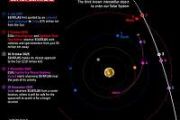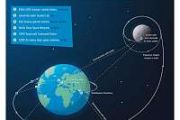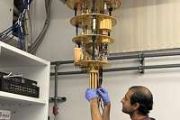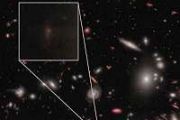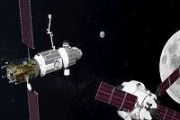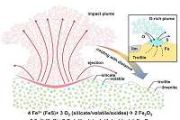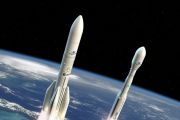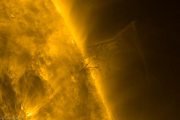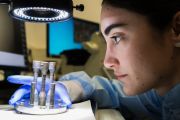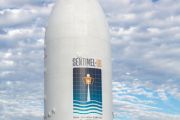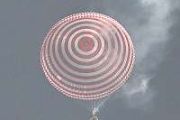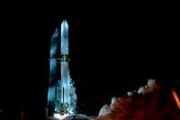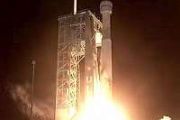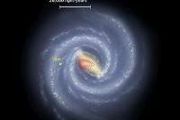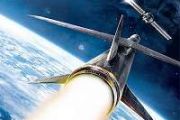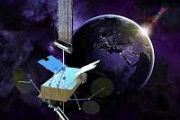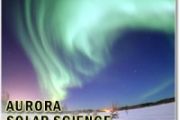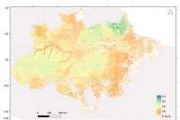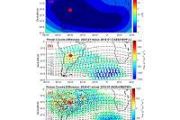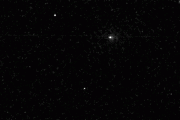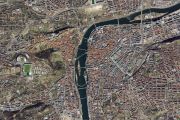
Copernical Team
We've pumped so much groundwater that we've nudged the Earth's spin
 By pumping water out of the ground and moving it elsewhere, humans have shifted such a large mass of water that the Earth tilted nearly 80 centimeters (31.5 inches) east between 1993 and 2010 alone, according to a new study published in Geophysical Research Letters, AGU's journal for short-format, high-impact research with implications spanning the Earth and space sciences.
Based on climat
By pumping water out of the ground and moving it elsewhere, humans have shifted such a large mass of water that the Earth tilted nearly 80 centimeters (31.5 inches) east between 1993 and 2010 alone, according to a new study published in Geophysical Research Letters, AGU's journal for short-format, high-impact research with implications spanning the Earth and space sciences.
Based on climat Seoul military salvages North Korea's space rocket wreckage
 South Korea's military said Friday it had successfully retrieved a large chunk of a crashed North Korean space rocket from the sea bed after 15 days of complex salvage operations.
North Korea attempted to put its first military spy satellite into orbit on May 31, but the projectile and its payload crashed into the sea shortly after launch due to what Pyongyang said was a rocket failure.
South Korea's military said Friday it had successfully retrieved a large chunk of a crashed North Korean space rocket from the sea bed after 15 days of complex salvage operations.
North Korea attempted to put its first military spy satellite into orbit on May 31, but the projectile and its payload crashed into the sea shortly after launch due to what Pyongyang said was a rocket failure. NASA uses new air taxi ride simulator to test passenger comfort
 To create a future where air taxis are a regular form of transportation, passengers need to be comfortable. That's why researchers at NASA's Armstrong Flight Research Center in Edwards, California are exploring how passengers may experience an air taxi ride by building a custom virtual reality flight simulator.
NASA is currently researching the human physiological response to motion, vibra
To create a future where air taxis are a regular form of transportation, passengers need to be comfortable. That's why researchers at NASA's Armstrong Flight Research Center in Edwards, California are exploring how passengers may experience an air taxi ride by building a custom virtual reality flight simulator.
NASA is currently researching the human physiological response to motion, vibra USTC explored gravity's effect on quantum spins
 A joint research group led by Prof. SHENG Dong and Prof. LU Zhengtian from the University of Science and Technology of China (USTC) of the Chinese Academy of Sciences (CAS), investigated the coupling effect between neutron spin and gravitational force via employing a high-precision xenon isotope magnetometer. This work was published in Physical Review Letters, entitled "Search for Spin-Dependent
A joint research group led by Prof. SHENG Dong and Prof. LU Zhengtian from the University of Science and Technology of China (USTC) of the Chinese Academy of Sciences (CAS), investigated the coupling effect between neutron spin and gravitational force via employing a high-precision xenon isotope magnetometer. This work was published in Physical Review Letters, entitled "Search for Spin-Dependent Innovation and investment propel Earth Observation industry to new heights
 The Earth Observation (EO) industry continues to see a surge in technological innovation, satellite deployment, and investment opportunities, underlining the sector's pivotal role in our evolving understanding of our home planet.
Satellite deployment is rapidly increasing, with companies such as Muon Space, ICEYE, and Satellogic all announcing successful launches. Muon Space's debut satell
The Earth Observation (EO) industry continues to see a surge in technological innovation, satellite deployment, and investment opportunities, underlining the sector's pivotal role in our evolving understanding of our home planet.
Satellite deployment is rapidly increasing, with companies such as Muon Space, ICEYE, and Satellogic all announcing successful launches. Muon Space's debut satell Global collaboration drives record-breaking advances in small satellite industry
 In a great week for NewSpace, global collaborations have led to record-breaking achievements across the small satellite sector, with a focus on autonomous technology, enhancing global internet connectivity, and ever increasing commercial applications.
First up, China has set a new national record by successfully launching 41 satellites into orbit on a single mission via their Long March 2D
In a great week for NewSpace, global collaborations have led to record-breaking achievements across the small satellite sector, with a focus on autonomous technology, enhancing global internet connectivity, and ever increasing commercial applications.
First up, China has set a new national record by successfully launching 41 satellites into orbit on a single mission via their Long March 2D ASU study: Jupiter's moon Europa may have had a slow evolution
 Jupiter's moon, Europa, is slightly smaller than Earth's moon and is one of the most promising places to search for alien life.
Amid the Jovian system, Europa is of particular interest to scientists because of the strong evidence for nutrients, water and energy to potentially provide a habitable environment for some form of life beyond Earth. In addition, Europa is believed to be made of f
Jupiter's moon, Europa, is slightly smaller than Earth's moon and is one of the most promising places to search for alien life.
Amid the Jovian system, Europa is of particular interest to scientists because of the strong evidence for nutrients, water and energy to potentially provide a habitable environment for some form of life beyond Earth. In addition, Europa is believed to be made of f VAST selects Impulse Space for Haven-1 Space Station Propulsion
 In an important move for commercial space travel, Vast, an innovative company in space habitation technologies, has partnered with Impulse Space for the provision of propulsion systems for the Haven-1 Space Station. The two companies will closely collaborate to install this crucial subsystem to Haven-1, which is planned to be launched into low-Earth orbit using a SpaceX Falcon 9 rocket in August
In an important move for commercial space travel, Vast, an innovative company in space habitation technologies, has partnered with Impulse Space for the provision of propulsion systems for the Haven-1 Space Station. The two companies will closely collaborate to install this crucial subsystem to Haven-1, which is planned to be launched into low-Earth orbit using a SpaceX Falcon 9 rocket in August UK Nuclear Fusion company announces space rocket US Partnership
 The UK-based company Pulsar Fusion, specializing in nuclear fusion, has announced a collaboration with the US firm, Princeton Satellite Systems. The collaboration will employ artificial intelligence (AI) in the design of a space rocket, aiming for a notably increased speed. This improvement could significantly decrease the mission time to Saturn's moons, reaching them in approximately two years.
The UK-based company Pulsar Fusion, specializing in nuclear fusion, has announced a collaboration with the US firm, Princeton Satellite Systems. The collaboration will employ artificial intelligence (AI) in the design of a space rocket, aiming for a notably increased speed. This improvement could significantly decrease the mission time to Saturn's moons, reaching them in approximately two years. Juno captures lightning bolts above Jupiter's north pole
 In the realm of outer space, Jupiter's lightning continues to intrigue scientists and NASA's Juno mission is at the forefront of this exploration. The spacecraft recently recorded an illuminating bolt of lightning in a vortex near Jupiter's north pole, lending further insight into the atmospheric phenomena of the largest planet in our solar system.
Much like Earth's lightning bolts that st
In the realm of outer space, Jupiter's lightning continues to intrigue scientists and NASA's Juno mission is at the forefront of this exploration. The spacecraft recently recorded an illuminating bolt of lightning in a vortex near Jupiter's north pole, lending further insight into the atmospheric phenomena of the largest planet in our solar system.
Much like Earth's lightning bolts that st 
